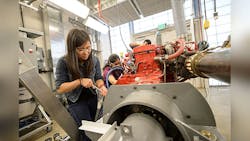University project focuses on cutting fuel consumption
Purdue University is leading part of a national effort to reduce vehicle fuel consumption by 20% through automated systems that interconnect trucks and cars and the transportation infrastructure using sensors and online cloud technology.
The US Department of Energy’s Advanced Research Projects Agency-Energy (ARPA-E) has announced up to $32 million in funding for 10 projects as part of its Next-Generation Energy Technologies for Connected and Autonomous On-Road Vehicles (NEXTCAR) program.
Purdue leads a project focusing on Class 8 trucks and will work with team members Cummins Inc, Peloton Technology, Peterbilt Motors Co, the National Renewable Energy Laboratory and ZF TRW.
The Purdue-led team will receive $5 million over three years for its project, which begins in March 2017.
This team includes Neera Jain, an assistant professor of mechanical engineering; Daniel DeLaurentis, a professor of aeronautics and astronautics; Shaoshuai Mou, an assistant professor of aeronautics and astronautics, and Srinivas Peeta, the Jack and Kay Kockema Professor in Civil Engineering.
Much of the research will be performed in Ray W. Herrick Laboratories’ Cummins Power Laboratory. Engineers from Cummins, a manufacturer of diesel engines, will spearhead development of algorithms needed to operate the engine and related systems. The project also will involve four Purdue graduate students.
The Purdue team will pursue three concepts: on-the-fly recalibration of the engine and transmission to constantly adapt to new conditions; running model-based control algorithms from the cloud as the vehicle is driving; and platooning with enhanced capabilities, such as synchronizing transmission shifting between two trucks.
The vehicles will tap into information that reveals changes in road, traffic and driving conditions several miles ahead. Each truck will be connected to a cloud-based network operations center, enabling access to information from crowd-sourced traffic data, road-grade maps and weather services.
New algorithms will allow “platooning” for trucks, which is designed to reduce aerodynamic drag.
Peloton Technology’s platooning system provides a wireless vehicle-to-vehicle (V2V) communications link between the throttle and braking systems of pairs of trucks, allowing the trucks to coordinate speeds and maintain a safe, aerodynamic following distance. Optimizing the powertrain via information about the road ahead allows for enhancements to platooning algorithms. Today, platooning with the Peloton Technology two-truck platooning system results in average fuel savings of 7% at a following distance of 36 feet, based on 4.5% fuel savings for the lead truck and 10% for the following truck. Enhanced algorithms promise to boost average fuel savings from platooning to as much as 13%.
NREL will assist with testing of the trucks on both tracks and roads. Peterbilt will advance its Platooning Development Program to include capabilities such as over-the-air (OTA) engine/transmission calibrations for route, weather and traffic changes. Real-time engine and transmission control cloud updates will allow platooning trucks to be fine-tuned for optimum fuel efficiency.
Call 317-650-6804 or access www.cummins.com for more information.
